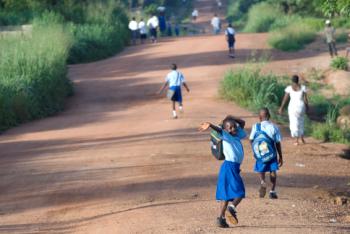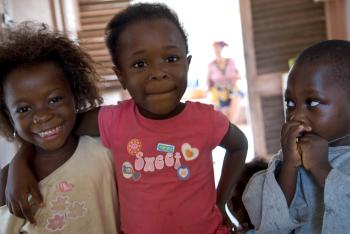Returning to normality is not an easy feat and will take time

The civil war in Sierra Leone deeply affected SOS Children’s Village Bo, which had to be evacuated several times in the 1990s. Today, Bo is the second largest city in Sierra Leone with an estimated population of 234,000 and it is an important financial, educational and commercial centre in the country.
However, the region continues to struggle with high levels of poverty and has a number of social problems to deal with. The reintegration of ex-combatants into civilian society is a challenge – these young men must find new livelihood strategies. Educational and employment opportunities are limited, so many have to resort to menial jobs or driving motorcycle taxis as a source of income, even if they previously trained in a profession. Their social status tends to be low and they are often regarded as violent or aggressive due to their former combatant lifestyle. The low wages these young men are able to make are usually not enough to sustain a family.
Another problem is the limited availability of infrastructure and social services. In 2010 there were only 200 doctors employed by the state to serve the entire population of the country. This shortage of health services resulted in an inability to respond quickly to the Ebola outbreak in 2014. During the war, a great number of children lost their parents and thousands of families were internally displaced, having to leave their homes and support networks behind. The Ebola epidemic left even more children without parental care. Child care institutions are scarce in the country and assistance for struggling families is also not sufficiently available. In addition, many children are undocumented, holding no papers to prove their identity. This can make entry into education more difficult and cause problems later in life.
Children and young people need hope for the future
SOS Children’s Villages began its work in Bo in 1983. The nature of our work in the country has varied and was deeply affected by the civil war, during which our efforts focused on emergency relief. The entire Bo District suffered greatly, and many cities and towns in the region were destroyed. The city of Bo received a great number of displaced people from around the country, and these people needed support when they arrived in Bo.
What we do in Bo

Care in SOS families: For children from the region who can no longer live with their parents, SOS families can provide a loving home. In each family, the children live with their brothers and sisters, affectionately cared for by their SOS parent. Some families live in different neighbourhoods of the city, alongside local families. They receive the same level of support from our team working there.
Education: The children attend the SOS Kindergarten together with children from the neighbourhood. This ensures that children from SOS families make friends and are integrated into the community from a young age. The children then go on to complete their education at the SOS Hermann Gmeiner primary and secondary schools in Bo, which are attended by around 550 pupils. The schools also offer vocational training courses in dressmaking, textiles, typewriting, home economics, and catering.
Young people: When young people from the children’s village reach an age where they are ready to move out of the family home, the SOS Youth Programme makes shared accommodation available. Qualified SOS co-workers accompany and support the young people on their journey to becoming independent adults.